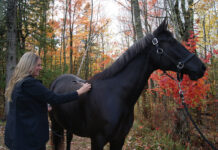
Base Diet
The first step in feeding your horse to good health is examining his baseline diet (forage and grain). If he grazes on beautiful green pasture all day, he is most likely getting all the fiber, vitamins and fatty acids he needs.
If your horse does not get to graze on pasture, think about his hay. Does he eat a high-quality grass hay, or alfalfa? Is it young and leafy, or mature and stemmy? These factors will affect the calories and nutrients he’s getting.
For most horses, feeding hay at 2 percent of body weight (assuming it is good quality) will meet forage needs. Horses in particularly heavy work or hard-keeping types may need grain to supplement calories. It’s always best to feed a commercial bagged concentrate so the protein, vitamins and minerals are already balanced for you if you feed per label directions. (If you feed pure/straight grains, your horse is likely to be deficient in some of the micronutrients.)
Concentrate should never make up more than 50 percent of daily calories, or fed at more than 5 pounds per meal for the average-sized horse.
If your forage and concentrate sounds like it’s on par, read on to find out what types of supplements are lining the shelves at your feed store and which ones are most likely to provide the benefit you’re looking for.
Vitamins and Minerals
If your horse eats only hay, he may be lacking in some vitamins that diminish after baling. Both hay and pasture can be deficient in minerals depending on the soil in which they’re grown.
If you add supplements containing vitamins or minerals to your horse’s diet, you’ll want to make sure they don’t contain excess amounts on top of those he’s already getting through his feed. Certain vitamins and minerals can create an unhealthy imbalance or even toxicity if given in high doses.

Joint Health
One of the most popular categories of supplements to feed is joint health.
To take protective measures against osteoarthritis, which can occur even in younger performance horses, or to help an older horse that has some creaky days, a joint supplement may be worthwhile. Try it for 30 days to see if you notice a positive change; if so, you may want to continue feeding it.
There are a wide range of brands and types of joint supplements available. Active ingredients can include glucosamine, chondroitin sulfate, hyaluronic acid, methylsulfonylmethane (MSM), avocado/soybean unsaponifiables (ASU), yucca, devil’s claw, vitamin C, ester C, collagen and silica.
Gastric Support
Gastric ulcers are extremely common among horses that are stabled, heavily exercised and/or trailered frequently. Once ulcers appear, the only FDA-approved treatment for horses is GastroGard (omeprazole paste), which must be prescribed by your vet.
Of course, prevention is the best medicine. In addition to management changes such as increased grazing or hay feedings, many supplements are intended to help prevent ulcers. Antacids, soluble fiber, L-glutamine, collagen, aloe, sea buckthorn and licorice are some of the ingredients fed to horses prone to ulcers.
Metabolic Disease
Horses with metabolic diseases (insulin resistance, Cushing’s, equine metabolic syndrome) require very careful dietary control, and sometimes prescribed medication. Talk to your vet about the best way to feed your metabolic horse to keep him healthy, and ask what type of supplements he might benefit from.
Ingredients in metabolic supplements are designed to help regulate blood sugar, boost the immune system, and strengthen tissues. These can include chromium, magnesium, vitamin E and herbs.
Hoof Health
Many horse owners struggle with weak, brittle hooves that chip, crack and lose shoes. If hoof quality is due to a dietary deficiency, a supplement may help make a noticeable improvement. Since the hoof category of supplements is one of the largest in the horse world, ingredients vary dramatically.
Some of the most common are biotin, lysine, methionine, threonine, zinc, copper, cobalt, MSM, and omega 3 and 6 fatty acids. It takes nearly a year after the supplement is started for the foot to grow out completely, so be patient when waiting for results.
Digestive Support
If you have a senior horse, or one that is prone to colicking or other gastrointestinal disturbances, a digestive-support supplement might be right for him.
These typically include prebiotics (live, beneficial bacteria that live in the gut), probiotics (yeast or oligosaccharides), and digestive enzymes.
Immune System/Antioxidants
Horses under stress (a heavy work or competition schedule) may be more susceptible to disease or damage from free radicals.
Look for ingredients such as vitamin C, vitamin E, selenium, antioxidants, grapeseed extract, bioflavonoids and herbs.

Skin and Coat
Fatty acids from oils and other high-fat sources help promote skin health and a shiny coat.
Coat supplements can contain flaxseed, rice bran and fish oil as sources of omega 3 and omega 6 fatty acids.
Electrolytes
If your horse is in heavy exercise, particularly if you live in a hot and/or humid climate, he may benefit from electrolyte supplementation. Unlike regular salt, electrolytes are designed to replace the minerals in the proportions lost in a horse’s sweat.
Electrolytes can be combined with feed, fed as an oral paste, or dissolved in water. Always make sure your horse has plenty of plain water to hydrate himself if you use electrolytes.
Calming
For horses that are extremely nervous, spooky or tense, a calming supplement may be helpful.
These often contain ingredients that target the nervous system and/or herbal remedies. Ingredients can include vitamin B1, magnesium, L-tryptophan, valerian, chamomile and hops.
Senior Care
Senior horses can have a variety of health concerns, including joint support, immune health, losing weight and colic, so senior supplements are usually an all-in-one formulation with multiple ingredients.
Check labels to compare ingredients to make sure you choose one that addresses your particular senior’s concerns without overlapping anything else you’re already giving him.
Final Notes
Always feed supplements from a reputable manufacturer, such as those that have applied for the seal of approval from the National Animal Supplement Council (NASC). This symbol provides quality assurance that your horse will be getting the active ingredients specified on the label.
Be sure to check with your show association for prohibited substances, as sometimes even herbal formulas can show up as a positive test that will disqualify you from competition.
Before diving headlong into a complex routine of supplements, consult with your vet to make sure you’re on the right track.
Managing Editor HOLLY CACCAMISE has an M.S. in animal science with a specialization in equine nutrition and exercise physiology.
This article originally appeared in the October 2017 issue of Horse Illustrated magazine. Click here to subscribe!





